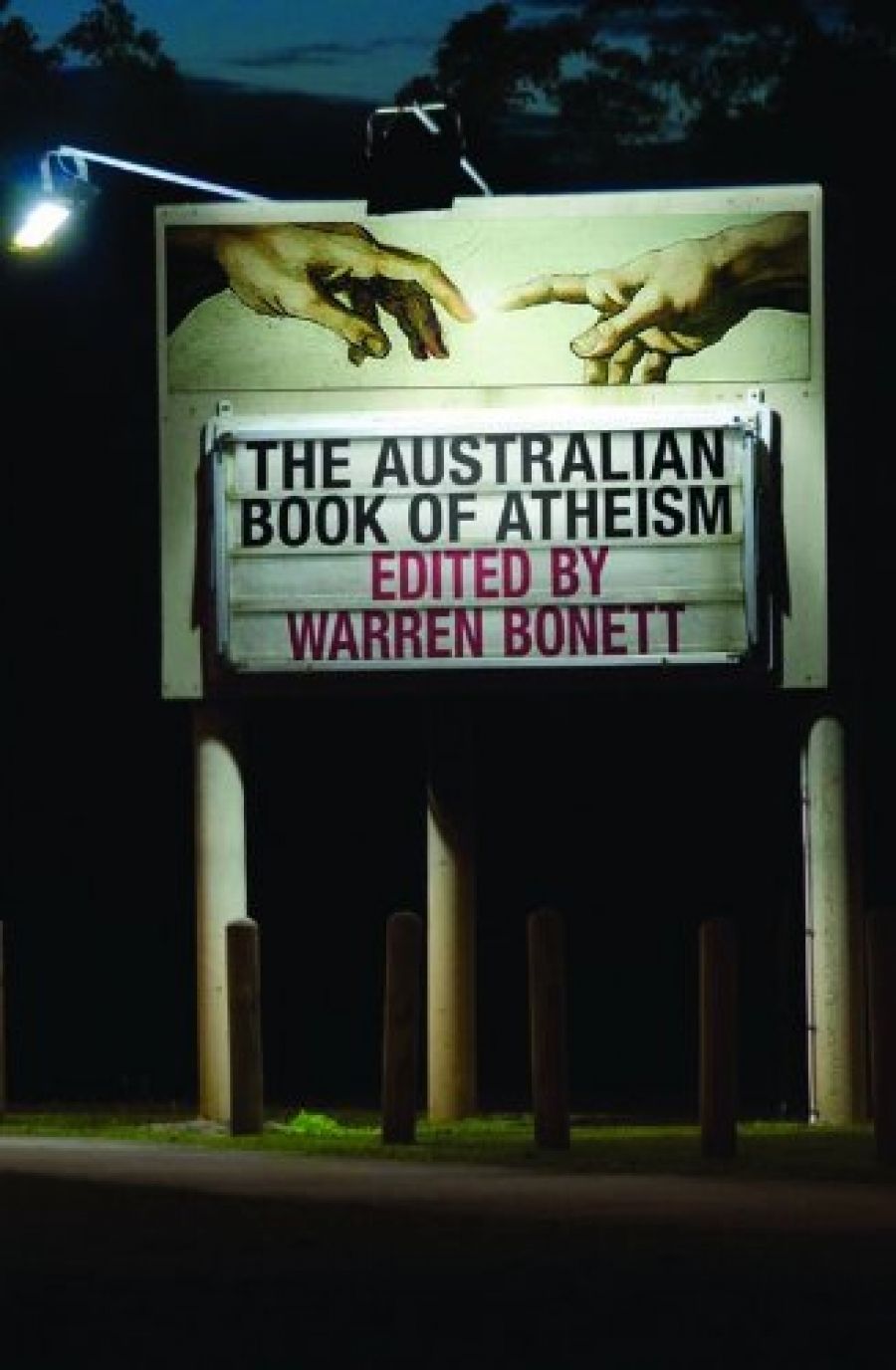
- Free Article: No
- Contents Category: Society
- Review Article: Yes
- Online Only: No
- Custom Highlight Text:
Once mainly associated with shrill killjoys and desiccated reductionists, atheism has recently received a jolt of adrenaline from Christopher Hitchens, Richard Dawkins, and others. Yet while these writers delight in exposing religion’s philosophical deficiencies, their tone is predominantly negative. Fortunately, The Australian Book of Atheism goes beyond simply rehashing the New Atheists’ explanations of Why God Doesn’t Exist. Divided into ‘Overview’, ‘Personal’, ‘Education’, ‘Social and Cultural’, ‘Politics’, ‘Philosophy’, and ‘Religion and the Brain’, this collection offers a more nuanced picture of atheism than does the recent crop of celebrity-authored blockbusters.
- Book 1 Title: The Australian Book of Atheism
- Book 1 Biblio: Scribe, $35 pb, 442 pp
The philosophical arguments for God’s existence are efficiently (even gleefully) crushed. Most effective is Peter Ellerton’s ‘Theology Is Not Philosophy’,which deflates theology’s philosophical pretensions by accusing it of ‘promot[ing] an acceptance of avoiding, minimising, or otherwise refashioning philosophical analysis, inductive reasoning, and deductive logic, while dishonestly brandishing them as the legitimate tools of its trade’. Any purported philosophy which employs such trickery, Ellerton argues, is bunk. Graeme Lindermayer makes similarly short work of Intelligent Design, a shoddy rearguard action, which ‘proposes that desired new forms of life have been intentionally brought into being’. It is hard to argue with Lindermayer’s curt dismissal of this logically circular god-of-the-gaps enterprise as ‘an incompletely developed reaction to the theory of evolution’.
The contributors aren’t big on compromise. Agnosticism, for example, is verbally tarred and feathered by David Horton, who draws a useful distinction between issues that warrant doubt and those that don’t. ‘Agnosticism about some events and causes in the passing parade of history is a valid intellectual position. Agnosticism about alternative medicine, or climate change, or evolution, or imaginary friends, is not.’
The perennial taunt about atheists’ supposed ‘militancy’ is countered by editor Warren Bonett, who invites readers to visualise a garden-variety religious militant beside the hypothetical atheistic variety. The fact that ‘the former is probably pictured wielding a gun and the latter is Richard Dawkins with a bit of colour in his cheeks’ exposes the ‘militant atheist’ charge as baseless.
While these hatchet jobs are entertaining, the policy analysis is simply disturbing. Jane Caro, for example, exposes the religious lobby’s disproportionate influence over Australian abortion laws, rejecting its ‘claim that the woman in whose body the pregnancy is taking place is not a fit person to make decisions about the pregnancy’s future, or her own’. Euthanasia advocate Philip Nitschke is scathing about the lobby’s successful attempt to bring about the repeal of the Northern Territory’s euthanasia laws, which quashed ‘the option of lawful help for the terminally ill’. Hugh Wilson savages religion’s financial chokehold on Australian politics, with Queensland’s Christian lobby raking in ‘$10 million of Queensland taxes and $165 million of Commonwealth taxes to provide frequently untrained and educationally unqualified school chaplains to state schools’. Similarly, Michael Bachelard slams the Howard government’s kowtowing to the Exclusive Brethren, a movement with the ‘classic features of a cult’. While I had thought of religion as a minor influence on state and federal governments, these essays persuaded me otherwise.
Most importantly, former Senator Lyn Allison argues that religion’s intractably anti-Enlightenment principles are fundamentally hostile to women. She insists that ‘until we challenge out loud the moral authority the Church insists it has, women will never be considered fully human’. Reflecting on an appalling list of religiously motivated crimes against women, Allison sardonically asks: ‘Ever wonder why God is a bloke?’
Unmasking theology’s intellectual pretensions is important, but providing scientific evidence in favour of atheism is more difficult. The section on ‘Religion and the Brain’ suffers from reducing complex phenomena to neurological diagnoses. Rosemary Wemm’s assertion that people with Temporal Lobe Epilepsy often ‘have intense religious, ecstatic, and “spiritual” experiences’ may be true, but it doesn’t answer the puzzle of religion’s lasting popularity and social importance.
Several essays attempt to present atheism as a unified alternative to religion, with partial success. Robin Craig, outlining ‘an objective, secular ethics’, suggests that such a system must be based on ‘individual rights – meaning each person must be allowed to live according to their own reason, with other people banned from forcing them to do otherwise’. Yet Craig’s moral framework lacks detail about conflicting goals. For instance, while two people could hold rational arguments for and against, say, late-term abortion, it is unclear whether this disagreement could ever be definitively settled under Craig’s system. Invoking ‘individual rights’ to resolve conflicts over issues such as a foetus’s moral status simply begs the question.
Many other appealing morsels lie scattered within, including Tim Minchin’s ‘Storm’, a bracingly bitchy poem about a ‘spiritual’ nitwit; Tanya Levin’s ‘Far Above Rubies’, which ponders the fate of an inquisitive schoolgirl trapped within a fundamentalist family; and Senator Lee Rhiannon’s ‘Growing Up Atheist’, which affectionately recalls growing up with an atheist father.
The Australian Book of Atheism includes multiple strands of anti-religious thought from notables across several disciplines, and analyses religion’s logical and ethical inconsistencies while mounting a defence of atheism as a genuine alternative. Reasonable in tone and catholic in approach, it is guaranteed to annoy the right people.


Comments powered by CComment